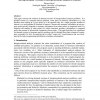Free Online Productivity Tools
i2Speak
i2Symbol
i2OCR
iTex2Img
iWeb2Print
iWeb2Shot
i2Type
iPdf2Split
iPdf2Merge
i2Bopomofo
i2Arabic
i2Style
i2Image
i2PDF
iLatex2Rtf
Sci2ools
139
click to vote
CC
1994
Springer
1994
Springer
Solving Demand Versions of Interprocedural Analysis Problems
This paper concerns the solution of demand versions of interprocedural analysis problems. In a demand version of a program-analysis problem, some piece of summary information (e.g., the dataflow facts holding at a given point) is to be reported only for a single program element of interest (or a small number of elements of interest). Because the summary information at one program point typically depends on summary information from other points, an important issue is to minimize the number of other points for which (transient) summary information is computed and/or the amount of information computed at those points. The paper describes how algorithms for demand versions of program-analysis problems can be obtained from their exhaustive counterparts essentially for free, by applying the so-called "magic-sets" transformation that was developed in the logic-programming and deductive-database communities.
Related Content
| Added | 09 Aug 2010 |
| Updated | 09 Aug 2010 |
| Type | Conference |
| Year | 1994 |
| Where | CC |
| Authors | Thomas W. Reps |
Comments (0)

